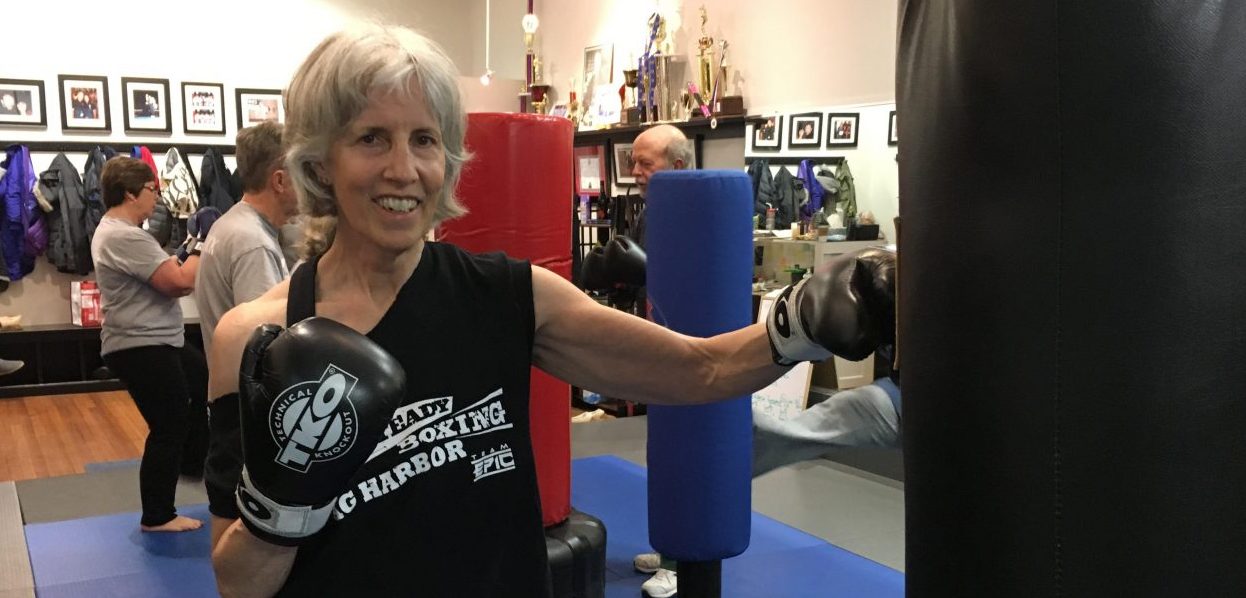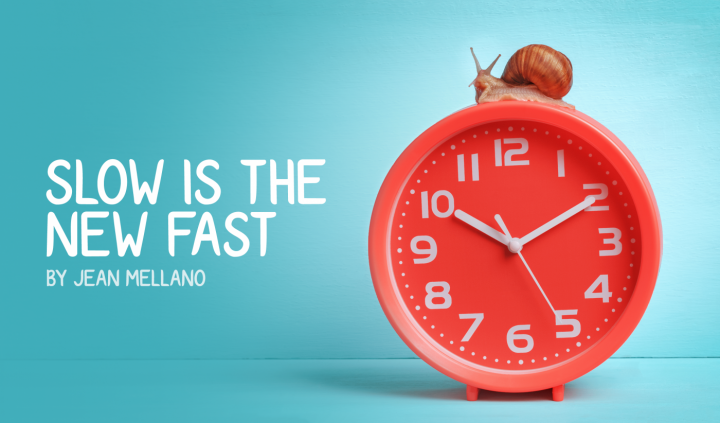Rock Steady Boxing: In the Beginning
Written by |

(Photo by Michelle Del Giorno)
In September 2017, I started to take Rock Steady Boxing (RSB) classes. RSB has truly made a remarkable impact on improving the quality of my life.
What’s it all about?
The RSB classes I attend twice a week average about 10 to 16 people per class. The ages of the participants vary, and we are all at various stages of the disease. Many participants deal with obvious symptoms like tremors. Some are like me, in the earlier stages of PD with no glaring symptoms.
My late husband was a well-known triathlon swim coach. Steve and I were together for over 33 years, and I was immersed in his world with athletes of all levels. However, I’ve found that the drive, dedication, and commitment of the RSB participants equals or exceeds that of most of the athletes I have known. Everyone I have met in RSB classes is determined to fight this cruel and insidious disease of countless losses. None will let PD get the best of them.
In 75 minutes, we work on our stamina, strength, speed, cognitive skills, and balance. We are encouraged to count loudly and also perform fine motor skill exercises. It is like a group physical therapy session, with the bonus of mental therapy. We celebrate each other’s triumphs, no matter how insignificant they may seem to the casual observer. As an example, if a participant succeeds for the first time to perform a “skip,” we will all loudly cheer him or her on. When we literally stumble or fail at a particular drill, there are more than enough sympathetic shoulders to lean on.
Laughter is the best medicine!
We will laugh at ourselves when the sometimes absurdity of our disease symptoms threaten to dampen our spirits. During our heavy bag punching drills, our coach will sometimes tell us to go faster. I think this is hilarious since “fast” is a foreign concept to me now. Every time she asks us to increase our speed, I break out into belly laughs.
But the tears do flow
However, at some point or another during a class, many of us will experience highly-charged emotional moments. It took only a month of taking RSB classes for me to have my first meltdown.
Interested in Parkinson’s Disease research? Sign up for our forums and join the conversation!
My emotions got the best of me as I was doing a footwork drill. This was a move I had once done with grace, rhythm, and fluidity, back when I used to dance. Now when I do this step, I feel like I have lead legs, and it takes every bit of my willpower to recreate just the mechanics (forget about the grace of a ballerina) of a once-simple step for me.
Another time, we “shoveled snow.” Using a spoon with our non-dominant hand, we were challenged to fill a bowl with as many cotton balls as we could in 30 seconds. I am right-handed, and my left side is most affected by PD. It was a huge struggle for me even to get nine cotton balls in the bowl using my left hand. My eyes started to well up with tears as I was doing the exercise. I felt so uncoordinated and helpless, trying to will my body to quickly perform such a simple task. The 30 seconds seemed like an eternity, but I was finally able to finish without crying mainly due to the support and kind encouragement from other participants. Seeing the beaming smiles on some of my fellow boxers’ faces bolstered my spirits. It is ironic how failing at one small mindless task can bring a person to tears, yet, if performed well it can be so satisfying, and such a joy.
While it may seem inconsequential, performing a fine motor skill task like “shoveling snow” can become monumental and overwhelming. This is just one small example of the simple movements I had always taken for granted that PD has robbed from me. I suspect that most of my fellow boxers in class that day truly empathized with me. Although their PD challenges may be different and unique to them, I believe they, too, have their moments of despair when they are reminded of what they have lost to this disease. PD affects everyone so differently, and while one class member may perform a drill well, another may struggle tremendously with it. There seems to be no rhyme or reason as to what any one person loses as a result of this disease. One thing we are all cognizant of is that PD does not discriminate. We also realize that what we can easily do today may be robbed from us tomorrow.
To be continued …
Since there is so much to share about my RSB journey, next month, I will continue talking about my boxing experiences.
***
Note: Parkinson’s News Today is strictly a news and information website about the disease. It does not provide medical advice, diagnosis or treatment. This content is not intended to be a substitute for professional medical advice, diagnosis, or treatment. Always seek the advice of your physician or another qualified health provider with any questions you may have regarding a medical condition. Never disregard professional medical advice or delay in seeking it because of something you have read on this website. The opinions expressed in this column are not those of Parkinson’s News Today or its parent company, Bionews Services, and are intended to spark discussion about issues pertaining to Parkinson’s disease.




Coach Hans
Jean, thank you for the great testimonial for RSB and telling it like it is. As fellow RSB fighter and now coach ,you inspire me and countless others.
Thank you so much Coach Hans. I find we all inspire each other in class :-)
Beckey
Jean, you've got plenty of guts.
Thanks Becky!